Students appreciate the new subject in Cambodian schools. FCA, together with the Cambodian Ministry of Education, Youth and Sport introduced career counselling and guidance in a country that needs its young to study and find their place in working life.
Vattey Oeur’s list of favourite subjects is impressive. ”I like mathematics, physics, history, khmer and career counselling,” she says.
The calm, slender 16 year-old, who is in her first year at high school, had always found it easy to follow mathematics lessons at school. Making a study plan and managing her time, skills that she learned at career guidance and counselling lessons, brought her mathematic abilities to an even better level – and the same has happened with other subjects, too.
“Before I only studied at school, but now I always revise at home, too. This has really improved my learning. I have learned how to set goals, make a study plan and I also know about different occupations for my future,” she says.
After learning career guidance and counselling in secondary school from grade seven onwards, Vattey decided to continue to high school.
“Career counselling has also made me know myself very well; what kind of a person I am and what I’m able to do. And it gave me knowledge on how to choose an occupation that fits my capacity.”
Vattey’s parents are farmers and vegetable sellers. But Vattey is planning for a career as mathematics teacher.
Her oldest brother had to migrate to Thailand to search for work and it is with the money he is sending home that the family has been able to fund its youngest member’s school materials and buy her a motorbike for the long way to school. There is no public transport here in the outskirts of Battambang city in western Cambodia.
CGC IN CAMBODIA
- In a poor country such as Cambodia, education isn’t often regarded as a good investment. Nearly half of children drop out of school before finishing 9th There is a huge need for skilled work force. It’s vital to get young people to study.
- As a result of FCA work, career counselling and guidance is incorporated in the national curriculum.
- The new subject is spreading. In third of Cambodian provinces there are secondary and high schools with career guidance and counselling. Teacher students in the new 4-year Teacher Education Colleges receive career guidance and counselling lessons. FCA will be developing an in-service training for teachers who want to become career counsellors.
“I was first very nervous”
Buntith Mak, Vattey’s career guidance and counselling teacher is one of the very first career counsellors in Cambodia. The former khmer language and literature teacher joined the first group of teachers who FCA trained with the help of Teachers Without Borders network.
They started working as career counsellors in 2016 in secondary and high schools in Battambang province. Some of them also trained as Master Trainers and have trained more career counsellors.
Mak is a Master Trainer and works here at Anlongvil Secondary School as career counsellor, the same school where he graduated from high school.
“I was first very nervous when I started as a career counsellor. It was a completely new subject in Cambodia and many were thinking it is not important, as students do not get a grade from it. But all of us here have seen a change in students. I have received good feedback. I’m now really proud of what I’m doing,” Mak says.
Modern, participatory teaching methods are central in career guidance and counselling.
“It’s is different from other subjects where the teachers just teach their subject,” Vattey says.
“In career counselling lessons we are even playing games – but in an educational way. When we have problems in learning, the games help. The tests we do during lessons or during face-to-face counselling make us understand ourselves better. And we know we can always go and talk with the career counsellor if we have problems at school. He helps us to solve them.”
Buntith Mak has also worked hard in developing cooperation between the school and the parents. Parents’ evenings have been a success and have given parents a better understanding on how to support their children’s education.
“My family has always supported my goal of getting a good education. I want my future work to improve my country,” Vattey says earnestly.
Text: Ulla Kärki
Photos: Ville Nykänen
Nearly two thirds of the Cambodian population are under 30 years old. Young people have tremendous potential for developing the country both economically and socially – but they need information about education and career opportunities.
”Career guidance has helped me a lot with my studies,” says Angkeriya Oeurn, 15, a high school freshman.
”Before career guidance, I didn’t know where I was, where I should be heading, or how to get there,” he describes.
Anlongvil Secondary School in the city of Battambang has had two career counsellors for over three years now. In 2015, it was one of the first schools in Cambodia to start offering career guidance, with support from Finn Church Aid.
“Other teachers teach their subject, but the career counsellor teaches how to set goals, spend time wisely, and choose subjects suitable for you. The career counsellor also makes us think about what we want to do in the future,” says Angkeriya.
Angkeriya dreams of becoming an engineer. He knows that in order to be admitted as a student, he must focus on mathematics, geometry, chemistry, and physics.
”Career guidance has taught me not only to work for my goals, but also to make decisions. Others won’t make decisions for me,” he says.
There is a happy bustle at the schoolyard. The children and young people are chatting, kicking a football, and throwing a basketball into plastic laundry baskets on top of poles held in place by one student at a time.
The school is big, with 1,800 students and a hundred teachers. Many have a commute of several kilometres. There is no public transportation. The schoolyard has a guarded parking area for bicycles and motorbikes.
Good results
Finn Church Aid started developing career counselling in Cambodia in order to narrow the gap between the education offered by schools and the know-how required in professional life. The gap is widened by the number of school drop-outs.
FCA trained the first-ever career counsellors in the country making use of the expertise of the volunteers in the Teachers Without Borders network. The results have been good. Schools offering career guidance have seen the numbers of school drop-outs decrease and learning outcomes improve.
”Even if a student ends up dropping out of school, I won’t leave them with nothing; we try to find them a place. Part of my job is keeping in touch with vocational schools and employers,” explains career counsellor Buntith Mak.
Career guidance is included in the national curriculum, and more counsellors are continuously being trained in cooperation with the Cambodian Ministry of Education.
Text: Ulla Kärki
Photo: Ville Nykänen
After her divorce, relatives refused to help. Now Kamu Sunar is the one people come to for help and advice.
A little boy comes to Kamu Sunar’s shop. He chooses a chocolate bar and hands over the money. He has already turned to leave when Sunar reminds him to take the change with him.
Kamu Sunar’s shop takes up one room in a two-storey stone building on the narrow main street of the village of Bhardeu. The shop sells a variety of items from soap and bracelets to shoes and petrol. The small village of Bhardeu is located in a verdant valley right in the middle of Nepal.
Sunar is a Dalit, or an outcaste, as well as an entrepreneur and a single mother. Now, she is also a municipal councillor on the Nepalese rural municipal council Gaupalika, meaning she gets to participate in local decision-making.
For several years, a women’s cooperative supported by the Finn Church Aid volunteer network Women’s Bank has operated in Sunar’s home village. The women who belong to it have received education and support for e.g. saving and agriculture as well as starting their own small businesses. The members of the cooperative have improved their financial and social position, but according to the women, equally important has been an improvement in self-esteem, team spirit within the group, and support from others.
And when a municipal election was held in Nepal, the women of Bhardeu decided to join forces. They voted for Kamu Sunar, a respected member of the group who had a slightly better chance of being elected, thanks to a Dalit quota. When she was elected, it was a victory for all of them.
In politics, Sunar wants to promote the financial and mental empowerment of women. In Nepal, the situation of women is still poor, and not everyone thinks rights such as ownership rights and financial power of decision belong to women just like they do to men.
Went to school in secret, married young
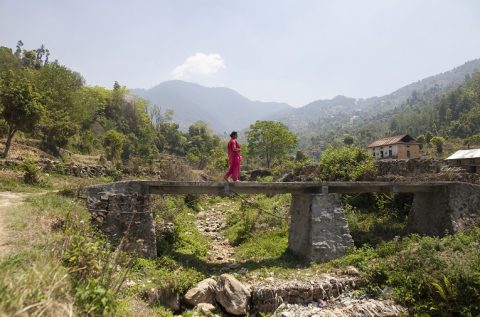
Remote Bhardeu has not always been home for Kamu Sunar. Her childhood was spent in the capital Kathmandu where her parents had a goldsmith shop. Her childhood as the eldest daughter of a family with five children was a happy one.
”I went to school for five years. After that, my parents wanted me to help my mother at home and my father at the shop. Even as a child, I was strong-willed. I was very interested in mathematics. I tried continuing to go to school in secret, but when my parents found out, I got a beating, and I had to drop out of school.”
Kamu Sunar sighs. Now comes the most painful part of her story.
A young man visited the goldsmith shop.
”I was 15 years old when we met, and he was six years older than me. We married for love.”
A couple of decades ago, love matches were much less common in Nepal than they are today. The newlyweds moved to the groom’s home village of Bhardeu. They were happy together for ten years.
”Then he found someone else. I don’t want to talk about it any more than this. He betrayed me. I don’t want to think about him,” says Sunar.
”No, I definitely never intend to marry again, because I don’t want that to happen to me again.”
When her husband left her, Sunar and her young children, a girl and a boy, were left destitute. The family of the husband did not want to help them.
”My children gave me courage. I didn’t want them to suffer.”
”Mom is kind-hearted and funny”
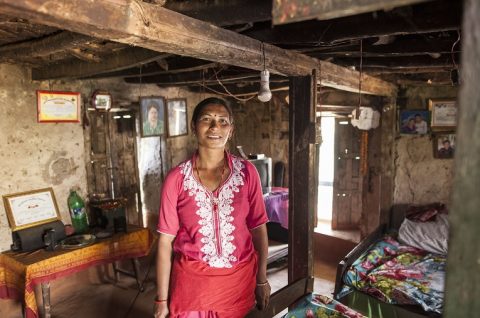
Being a member of the women’s cooperative helped Sunar rearrange her life. Little by little, Sunar acquired both skills and capital. She got a loan of 15,000 Nepalese rupees (110 euros) to start her own shop. Having her own shop had been a lifelong dream.
The shop was a success. Both of her children got the chance to stay in school for as long as they would like.
We close the shop for a while and go see Kamu Sunar’s construction site. She is about to fulfil another dream, a home of her own. Her time living in her ex-husband’s brother’s house is coming to an end. The house is not even safe, because it was damaged in the powerful earthquakes of 2015.
Sunar’s small plot of land is within walking distance of the shop in this beautiful valley in which the village is located. Houses are scattered few and far between in the valley, surrounded by meadows and terraced maize and mustard fields. In this country known for its snowy peaks, the tall green hills surrounding the valley cannot be called mountains.
At the plot, Sunar’s daughter and a friend are working in the heat of the sun, crushing rocks. You can also buy crushed rock, but it is cheaper to make your own.
Soon there will be a small house on the plot that belongs to no one but Sunar. It feels wonderful.
Tomorrow, 14-year-old daughter Amrita can leave crushing rocks behind and gets to go to school, as the school year starts.
”Amrita is stronger than I am. She talks a lot and has lots of suggestions,” says Sunar.
Amrita is interested in a career as a volleyball player. ”She gets to choose herself,” Sunar assures us. Her 18-year-old son Amit works in a goldsmith shop in Kathmandu, but often visits his mother and sister.
”Mom is kind-hearted and funny. And a little strict. Mom used to be very quiet, but not anymore. I’m really pround of her being on the council,” says Amrita.
Work on behalf of women
Outcaste people still face many kinds of discrimination in Nepal.
”I’ve suffered a lot because I’m outcaste. But I have learned a lot as well. I’m here now because I have had so much support,” says Sunar.
According to Sunar, all members of the council are like one big family.
”We dine together and help each other. There is no discrimination there.”
Sunar knows from experience exactly what kind of skills a woman needs in order to improve her situation in society. She is now in a position to give advice and help others.
Being on the council only pays a small fee, and the 460 municipal councils of an impoverished country do not have a great deal of funds to hand out for local development. 18 percent of the funds are especially reserved for supporting women. This is better than nothing at all.
”My mind used to be empty. Now I have lots of knowledge, skills and ideas,” describes Sunar.
”Now I’m very happy.”
Text: Ulla Kärki
Photos: Veera Pitkänen
Savitri Devi Mandal welcomes us into her home. We sit in a small courtyard surrounded by rooms. Mandal’s sari is vibrantly colourful. Her silver jewellery, part of the local culture, speak of her position as a married woman.
”I am very happy now, especially when working in our restaurant,” she says.
Mandal, 39, lives with her husband, her mother-in-law and her four children in the village of Gonarpura in the Terai region in southeast Nepal. In recent years, the life of the family has taken a major turn for the better.
Life in Gonarpura today is much the same as it has been for hundreds of years. The beautiful houses by the banks of the river are made of a mixture of clay and concrete. The corners of the houses are soft and round, their roofs are made of straw, and no cars would fit to drive on the narrow sand paths between the houses – not that anyone has a car here. Water comes from the well. Big haystacks in the field in front of the village provide food for the cows. Chicken and goats populate the yards.
The region is beautiful but poor. Terai is an underdeveloped region even on the scale of impoverished Nepal.
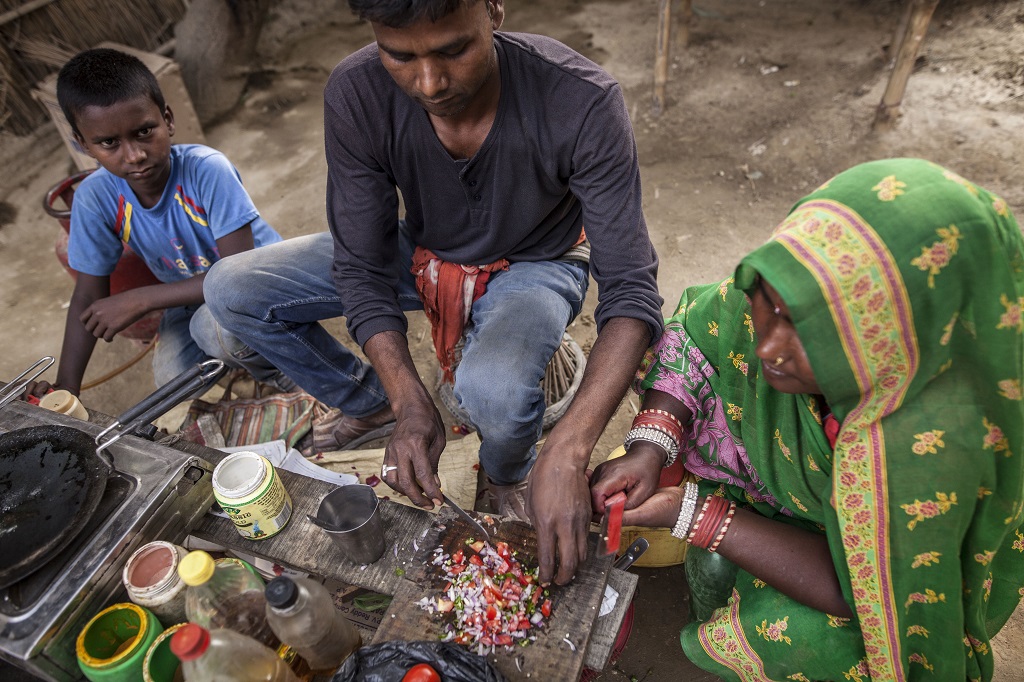
Savitri and Sankar are cooking, joined by son Saudi. Meat is not part of the restaurant’s menu, because it is too expensive.
Visibly proud, Mandal goes inside into one of the rooms for a gas cylinder and a small gas stove she got as entrepreneurial support that she drags out to show us. They helped her and her husband Sankar to start a ”restaurant.” They prepare and sell food at a small marketplace next to the village by a bridge crossing the river.
Something has changed in the village over the past few years – for the better. Finn Church Aid’s livelihood project has provided women with education and support for agriculture and small-scale entrepreneur activities, for example in the form of a cow or a sewing machine. New skills have brought wellbeing and decreased work migration to neighbouring country India.
”Forget about the dowry!”
”Now we can work together. My husband doesn’t have to leave home to look for work. We all have proper clothes. We are even able to put money away for saving. Our children are all in school, and we can afford to pay for school supplies and remedial education,” says Mandal, herself illiterate.
”Don’t save for the dowry yet, keep your daughter in school for as long as she wants to! It’s going to be long before she needs to marry,” advises Finn Church Aid’s project coordinator Arati Rayamajhi, when Mandal says her only concern is her daughter’s dowry. Daughter Laxmi is 13 years old.
Restaurant open every night
Savitri Devi and Sankar Mandal’s restaurant opens at four in the afternoon. 14-year-old son Chanchal transports the gas cylinder and stove to the marketplace with a push cart. Savitri and Sankar sit behind the stove, next to each other.
There are eggs on the table to make an omelette, with onions, tomatoes and chilli chopped as fillings.
They sit here every day until nine in the evening. ”However, I feel energised in the morning, because I don’t have to worry about something all the time anymore,” says Savitri Devi Mandal.
Text: Ulla Kärki
Photos: Veera Pitkänen
Jonaliese, Sauda and Daphe found a direction for their lives at FCA´s vocational school in Uganda. Thanks to their exceptional motivation, the young graduates from FCA´s school face no difficulties in finding work.
If someone had asked 20-year-old Jonaliese Karsugho where she will be in five years’ time, she would have hardly thought that she would be instructing a final project in metalwork at a Ugandan refugee settlement.
But here she is at the age of 25, in the middle of a metal workshop, dressed in a pink dress, going over the instructions of the final project in her native language of Kinyabwisha, for a group of young men.
Jonaliese’s future plans were altered by the war.
She escaped the violence in Congo to Uganda with her sister in 2014. Rebels killed Jonaliese’s parents. Amidst the chaos, her third sister disappeared. To this day, Jonaliese does not know whether her sister is still alive.
At Rwamwanja refugee settlement, Jonaliese supported herself and her younger sister first by cultivating land. One day, she saw an advertisement for a course organised by Finn Church Aid (FCA). After taking the farming course, the following year Jonaliese was accepted as an assistance leader for a metalwork course. As a result, she is now watching attentively as 15 students start hammering a sheet of metal into a toolbox.
Soon the air is filled with a horrific sound of banging metal hammers. We have to leave the classroom.
From a refugee to a barber
73 % of the young people trained by FCA find work
Rwamwanja refugee settlement was founded in the 1960’s to settle refugees of the Rwandan genocide. The settlement was closed for a few years, until unrest in Congo flared again in 2012.
FCA founded a vocational school in the area in 2015. Most of the young people participating in the vocational training have lived at the camp for 3-5 years. Out of the young people who have completed the training, an impressive 73 percent have either found employment or started their own business.
There are about 63,000 refugees living at Rwamwanja refugee settlement, most of whom having escaped the civil war in the neighbouring Congo. One of the biggest problems of the settlement, with a population roughly the size of the city of Vaasa, has been youth unemployment.
”When young people had nothing to do, they would just drink and gamble,” says FCA project coordinator Caphas Mugabi.
FCA started working at Rwamwanja three years ago by first mapping which professions the young people should be trained for, in order for them to have good chances at finding work. The first courses started in May 2015, training the youth to be construction workers, engine repairers, tailors, cooks, metalworkers, and barbers.
250 students are selected for the six-month long training twice a year. There are more applicants than there are openings, and the students are selected based on applications and interviews. Both refugees and young Ugandans are admitted into the training.
”We do not care about previous studies, since many have been forced out of school due to the war. What we care most about is motivation. Many of the young people are in a desperate need for training and work, for example in order to support younger siblings after their parents have died,” says Mugabi.
Finding work is the main goal of the training. The studies include an internship, learning about finding a job and entrepreneur skills. The results have been excellent. A total of 73 percent of the graduates have either found employment or started their own business.
”We feel as if our work here truly changes the lives of these young people,” says Mugabi.

Sauda Tusingwire found her calling at the FCA vocational school. ”I’m happy that I have a plan and a future now”. Photo: Fredrik Lerneryd
Clothes for twelve siblings
The clamour of the metal workshop eases a little as we cross the yard to another classroom. Here the air is filled with the buzzing of sewing machines, as some twenty young people are sewing the seams of skirts as part of their final project.
Sauda Tusingwire, 21, looks like a professional using her sewing machine. It is hard to believe that she first tried using a sewing machine only six months ago. The elegant dress Tusingwire is wearing is also designed and sewn by her.
”Although I was interested in becoming a tailor and I had lots of ideas for clothes, I didn’t know anything before starting this school,” says Sauda.
In addition to sewing her own clothes, Sauda has sewn clothes for her twelve siblings. For the children of a single father, the clothes sewn by their sister have been very welcome.
”However, the most important thing to me has been that I have been able to make money by selling the clothes I have made at school. My dream is to start a big business,” says Sauda.
”I also want a family, but not until I have started my business.”

Jonaliese Karsugho dreams about starting her own enterprise. Photo: Fredrik Lerneryd
Student counselor helps find work
Young people from harsh circumstances need additional support. They are assisted by FCA´s student counsellor Olivia Nazzawi. She visits the students and graduates regularly. After graduation, Nazzawi’s task is to help them find employment or start their own business.
”My job is to encourage and support them. At a refugee camp, it is easy for people to become passive and give up. It is then my task to say that you have no choice. You have to work,” says Nazzawi.
For example, graduates of farming studies are provided with a plot of land and farming equipment by the school. They can sell their crop at the marketplace or at a store and earn a living.
The employment prospects are brightest for construction workers, since there is a great deal of construction going on in the fast-growing area.
At the start of their career, graduates of catering studies may be offered a job at a small restaurant founded by FCA, and in addition, many have found employment at other restaurants in the area. Aside from the restaurant, FCA has founded a repair shop in which young people can gain work experience and earn money.

Wilson Kiiza loves his job as a mechanic. ”The thing I love the most is when I sometimes get to test drive the motorbikes.” Photo: Fredrik Lerneryd
”Now I can do something others can’t”
Last year, the most popular courses were those for hairdressers and tailors. Daphe Nantesa, 17, weighed between the two courses after she heard about the school from a teacher visiting her village. Daphe applied and was selected for hairdresser studies, which turned out to be a good choice for her.
Daphe has calculated that for one customer, she needs to buy hair salon materials for 10,000 Ugandan shillings (which equals roughly 3 euros). She can then charge the customer 30,000 shillings (approximately 8.5 euros).
”In this work, not a lot of initial assets are needed, and I don’t have to move anywhere, since the customers and their hair come to me,” Daphe smiles.
Daphe is Ugandan, and has seven siblings. Before the training, she felt as if there was nothing special about her.
”There was nothing that would have distinguished me from others. Now, after completing the training, I can do something that not everyone can!”
After graduating, she plans to work hard and save up the money, in order to be able to open her own hair salon one day. There, in her own business, she could teach young people as well.
”I want to give others the same opportunity to change their life that I’ve been given through the training,” Daphe says. For many young people, school has sparked a needed boost for their self-esteem.
For Jonaliese, who escaped from Congo four years ago, the training offered an opportunity to earn more money and start planning her future. If Jonaliese could decide, where would she be in five years’ time?
”I dream of a big business where I could train young refugees and offer them jobs. I want to provide young people with a chance to lead an independent life,” Jonaliese says.
Text: Noora Jussila
Translation: Leena Vuolteenaho
Photos: Fredrik Lerneryd
Read more about FCA’s work in Uganda.
Violent extremism contributes to some of the world’s worst humanitarian catastrophes. It also poses a challenge to the gains in development enjoyed by many countries in Africa, a new report concludes.
The typical extremist organisation recruit is a 17–26-year-old from a state’s poorest, peripheral areas with only a few years of secular education and a low level of religious literacy. At the time of joining, the recruit’s main concern in life is employment. His or her confidence in institutions and governance is limited.
This is one of the main conclusions of the UN Development Program UNDP’s extensive report, launched in Helsinki on Friday 4th of May. The Journey to Extremism report sheds new light on the path to radicalisation and on how the effects of violent extremism hampers humanitarian work and development cooperation. (Download the full report in pdf-format here.)
Researchers conducted interviews with 718 people from Somalia, Nigeria, Kenya, Sudan, Niger and Cameroon – the largest sample of interviews with former members of extremist groups thus far.
With the above-mentioned preconditions, a recruit only needs to reach a “tipping point” before making the final decision to join an extremist group. In 71 percent of the cases, the defining event consists of a government action, often an excessive security response against a perceived terrorist threat.
The decision to join is quick, says Mohamed Yahya, lead author of UNDP’s research. Some 80 percent join an extremist group within a year after the tipping point, and a striking 48 percent within less than a month.
“This emphasises the fact that development solutions are essential in addressing the incentives and drivers of violent extremism. Military solutions are not enough”, Yahya concludes.
Research in sync with FCA’s key findings
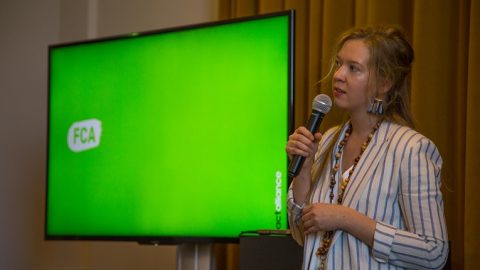
FCA’s Reach Out coordinator Milla Perukangas providing perspectives on preventing violent extremism in Finland. Photo: Rabbe Sandström
The destructive consequences of violent extremism have resulted in 33 300 fatalities in Africa between 2011 and 2016, not to mention the devastating effects related to displacement and economy.
Extremism-related research has thus far largely been the territory of organisations working with security issues, although the issue profoundly affects development actors, says Yahya. It threatens to stunt development outcomes for generations to come if left unchecked.
“How can you talk about sustainable development goals and women’s rights when the question for many is whether they dare to go to the market and take the risk to be blown up”, Yahya says.
Almost 80 percent of the interviewees had previous connections to the extremist groups Boko Haram and al-Shabaab, which Finn Church Aid’s (FCA) previous research has focused on. UNDP’s research is in line with FCA’s previous findings, for instance that family and friends – not religious leaders – recruit most members.
(Read more about FCA’s research on al-Shabaab by clicking here and about Boko Haram by clicking here.)
Yahya highlights the role of local voices as a counterbalance to the influence of extremist groups, especially the role of religious leaders, which is one of the key groups supported by FCA’s peace work.
“But we also need to create viable exit paths, which include opportunities created by development in these poor peripheral areas”, Yahya says and adds that current circumstances do not contain enough options.
“Like one of our interviewees said: ‘After I left Boko Haram, I was welcomed by poverty’.”
Trust is key in preventing violent extremism
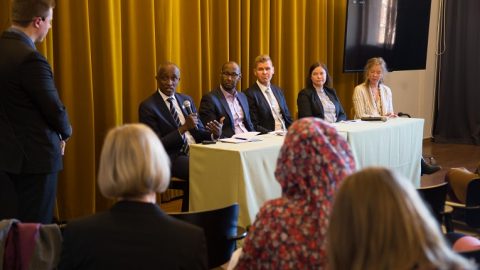
Panel discussion on preventing violent extremism, held at the UNDP’s report launch in Helsinki on May 4th. From the left UNDP’s Africa Regional Programme Coordinator Mohamed Yahya, Arshe Said from the Finnish Somali League, David Korpela from the Finnish Ministry for Foreign Affairs, Katja Creutz from the Finnish Institute of International Affairs and Milla Perukangas, FCA’s Reach Out coordinator. Photo: Rabbe Sandström
The question of how to prevent youth from joining extremist groups is a question for the whole society, says Milla Perukangas, coordinator for FCA’s Reach Out project against violent extremism in Finland. FCA has put its international experience and knowhow of preventing violent extremism in use in Finland since 2015 as a response to the vast number of foreign fighters traveling from Europe to conflict zones.
The solutions are always context-specific, but there are universal keywords that are applicable in all circumstances. Trust is one of them, says Perukangas. The Reach Out project has specialised in building bridges between those at risk of recruitment, their families, civil society actors and Finnish authorities.
“We need to empower youth through for instance education and opportunities to both speak their mind and find employment”, Perukangas said in her presentation at the report’s launch event in Helsinki.
“In the long run, the work to prevent violent extremism needs more emphasis on the human experience and the initial grievances of people in affected areas.”
Text: Erik Nyström
Download the full UNDP report The Journey to extremism in pdf-format by clicking this link. Read more about FCA’s research on al-Shabaab by clicking here and about Boko Haram by clicking here. Read more about the Reach Out project here.
Young people living in fragile conditions are not currently being taken into sufficient account in the field of humanitarian work and development cooperation. According to Youth on the Move, a report published by Finn Church Aid on 26 April, young people often tend to slip through the various forms of work and funding. Nevertheless, youth on the move are dynamic actors having enormous potential as builders of their own lives and societies.
“Civil society organisations should listen to young people more and reform their work to take better account of youth,” says Matthias Wevelsiep, Development Manager at the FCA.
“Currently, development cooperation, humanitarian aid and other such areas of work are unable to respond properly especially to the needs of Youth on the Move.”
There are about 1.8 billion people between the ages of 15 and 24 in the world today. Youth represent a large share of the population especially in countries with a great deal of poverty and uncertainty. Nine out of ten young people live in the developing countries. Young people also move increasingly from one place to another. In fact, 10 percent of the world’s refugees are 15 to 24 years of age.
Youth are on the move in more ways than one, moving from childhood into adulthood and through education and training to the job market. They also move in terms of geography either voluntarily or forced.
Refugee youth also have the right to education and livelihood
Through the report, the FCA wishes to foreground youth as active builders of their own future and the future of their communities and as enablers of change.
Especially in fragile situations, the transition of youth from one phase of life to another is interrupted and they may have to wait even for a long time to get on with their lives. Many of the youth living in difficult situations have to work in the grey economy in order to get by.
“We should be supporting young people’s access to education and training, offering them opportunities to continue with interrupted schooling,” says Wevelsiep.
“For example, youth in refugee camps should also be offered diplomas that make them eligible for further studies and employment both in their countries of residence and their countries of origin.”
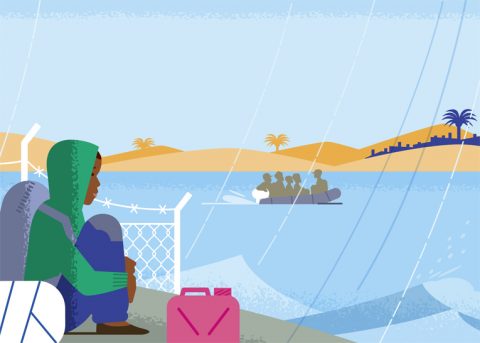
“Before training, I had nothing”
Providing vocational training in the developing countries is of the greatest importance in terms of youth and refugee policies, as well as national security.
“In Uganda, we are arranging vocational and entrepreneur training for local and refugee youth,” says Wevelsiep. “Up to 73 percent of the young people who have completed their training either have found employment or have established businesses of their own.”
“Before training, I thought I didn’t have anything unique of my own. I was just like all the other girls. Now after training, I know how to do something not everybody else does,” says Daphe Nantesa, a 17-year-old from Uganda, who participated in hairdresser training provided by the FCA.
FCA arranges entrepreneur training in Jordan for Syrian refugees and local Jordanian youth. Meanwhile, at the refugee camps in Za’atari and Azraq, the FCA also offers recreational activities, such as English lessons, a circus school and soccer.
Youth between the ages of 18 and 24 in unstable situations need protection as well. They are no longer covered by child protection measures, but they have a high risk of becoming victims of abuse, violence or neglect.
Nevertheless, the FCA report insists that we should not focus merely on the problems of youth.
In the words of Matthias Wevelsiep, “The potential of youth for active and dynamic action should be recognised and they should be empowered to participate in societal decision making and building the future.”
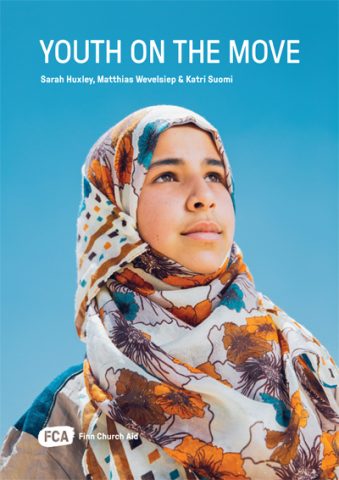
Youth on the Move Report (pdf)
Finn Church Aid and Omnia Education Partnerships Oy offer qualification program for refugees living in Uganda.
From spring 2018 on, refugees in Uganda will have the opportunity to graduate from the Finnish Further Qualification in Entrepreneurship. The qualification program is organized by FCA and Omnia Education Partnerships Oy (OEP) in close cooperation with UNHCR.
”Finnish qualifications have a good reputation globally. The qualification training opens up new opportunities for both employment and further studies for the refugees,” says Ville Wacklin, the Project Manager of FCA.
Uganda has received approximately 1 800 South Sudanese refugees daily since July 2016. A total number of 1,4 million refugees are currently living in Uganda. Many of them start their own small businesses.
Not only qualification, but sustainable change
The qualification training aims at improving the refugees’ chances to succeed as entrepreneurs. The training is customized to the local context together with the Ugandan experts.
“Our model emphasizes sustainability. We train and certify locals as trainers who then go on to train at refugee settlements. The curriculum and assessment process ensure that we uphold Finnish standards,” says Mervi Jansson, CEO of OEP.
Finn Church Aid (FCA) has decided to shut down its country programmes in Liberia and Sierra Leone by the end of 2017. Involvement in Liberia led to the founding of the Women’s Bank volunteer network which currently has thousands of volunteers.
“It is always difficult to make a decision like this. Over the past year we have worked hard to find new donors in both Liberia and Sierra Leone, but have not been adequately successful. However, it’s great that the work will continue by a local civil society organisation”, says Jouni Hemberg, FCA’s Executive Director.
Finn Church Aid has operated in both West African countries for ten years. Involvement began with rebuilding efforts after over a decade of civil war and included training on farming methods and provision of psychosocial support and education to former child soldiers, particularly girls.
“After ten years, our work is now picked up by locals. The Liberian staff members of our country office are founding a new, Liberian organisation to continue the work that FCA has done, and this is exactly how it should go”, Hemberg says.
The decision was affected in part by Finnish foreign ministry’s cuts on development funding but also FCA’s shifted focus on the most fragile countries of the world, which Liberia and Sierra Leone no longer are.
“At the moment we are discussing the closure of our programmes with beneficiaries and local partners and planning how we could best support them to ensure that the work remains on a sustainable foundation”, says Marjo Mäenpää, Desk Officer for West and Central Africa.
Income opportunities and Ebola prevention
FCA has maintained a country programme and a country office in Liberia since 2007. In Sierra Leone, FCA has been operating for seven years, and even before that, since 1993, FCA has supported the work of the Lutheran World Federation in both countries. During civil wars, work focused on providing basic necessities at refugee camps.
FCA’s own work has focused on developing village communities and supporting livelihoods in rural areas by organising training on farming methods and supporting youth professional education.
From 2010, FCA assisted refugees who fled violence in Ivory Coast during elections by maintaining schools on Ivorian refugee camps in Liberia.
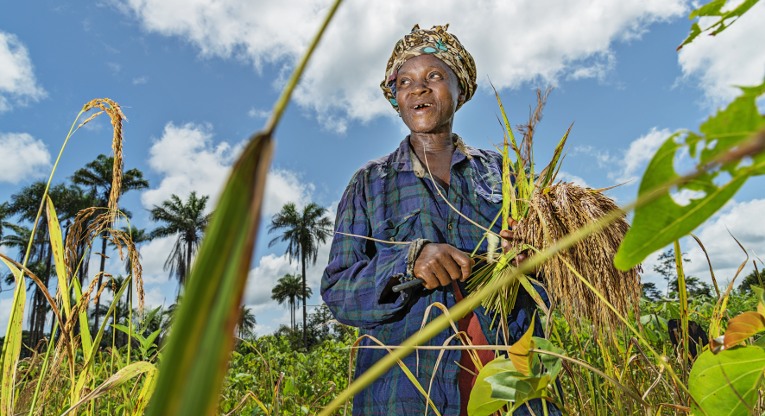
During the Ebola epidemic in West Africa, many rural families had to eat their seed corn. Omai Toka is harvesting her rice in the village Gohn in Grand Cape Mount county in 2015. She bought the seed corn with the support of Finn Church Aid’s food security programme. Photo: Ville Palonen.
During the Ebola epidemic in West Africa, FCA distributed hygiene products – like soap, buckets and chlorine –, organised large-scale awareness campaigns to prevent the spread of Ebola and supported efforts to maintain food security. The latest humanitarian operation was the distribution of relief packages to victims of landslides and floods in Sierra Leone in late 2017.
In Liberia, FCA will conclude its EU-funded project to train prison staff and communities and promote the rights of prisoners to legal counsel. The project will conclude in early 2019.
Women’s Bank volunteer network has its origins in Liberia
In January 2007, FCA invited a group of socially active women from Finland to travel to Liberia and meet local women. The trip inspired the group to act for the benefit of other women in developing countries. On 24 May 2007, Women’s Bank was formed and in ten years, it has grown into a network of over 3,000 volunteers and raised 11 million euros of funds to support more than 40,000 people in the developing world.
In Liberia and Sierra Leone, Women’s Bank supported vulnerable girls and women in obtaining livelihoods, for example by providing vocational education and entrepreneurship training. Altogether, 12,000 people benefitted from the Women’s Banks’ work in the two countries.
Tu-Myaung Village in Myanmar’s Irrawaddy Delta was hit hard by cyclone Nargis in 2008. Nwe Kyi was thankful her family of six survived the disaster.
But life was harsh. Although her husband Ko* Maung Kyi, 50, worked hard as a laborer in paddy fields and Daw** Nwe Kyi, 49, exhausted herself for a meager wage transplanting rice seedlings and reaping paddy, they often could not even afford daily meals for their three daughters, son and themselves. To make matters worse Nwe Kyi had to worry for her daughters because after the disaster human traffickers tried to lure young women away.
Nwe Kyi had just before Nargis borrowed money to invest in a coconut business. But the ship on which she had sent the coconuts to Yangon got hit by Nargis. She and her family were left homeless while having to repay the local loan shark at a steep interest rate of 10%. The family survived on food aid from local and international charities.
Saving started with 75 cents
A first attempt of the village to start a women’s group in 2009 failed, because no one was able to make any savings while having to rebuild their houses under a lot of stress and post-Nargis traumas. In 2014 they succeeded and now Ngwe Thawtar (Silver Moon) has seventeen members who have been working hard, with support of the Women’s Bank, to make it a success.
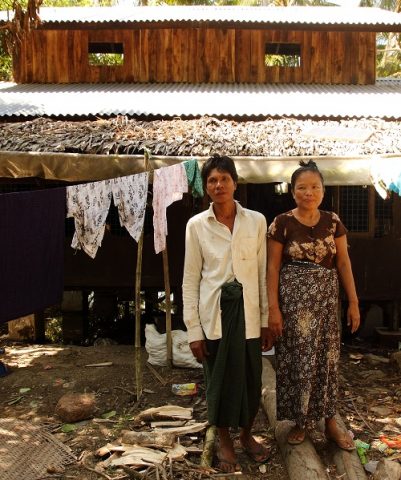
Nwe Kyi and Maung Kyi’s home is a proper wooden house.
Nwe Kyi started saving 1,000 kyats (± 0,75€) a month and invested a first loan of 100,000 kyat in two pigs.
“A few months later I sold them for 400,000 making a profit of 300,000! I invested the profit to grow paddy and made a 500,000 profit. I then borrowed 300,000 more to continue growing paddy. And now we built this house!” She proudly points at her brand new wooden house.
“We also have 180 ducks providing us a daily income of minimum 4000 kyat from selling eggs. I hope to open my own grocery store in the near future.
Most importantly, while older children could not stay in school because they had to help the family, their youngest daughter is now attending 7th grade.
“We can support her without difficulty to finish her education. Only education can save our children from poverty.”
“I know how to protect my daughters and granddaughters”
Women’s Bank with its Myanmar partner LWF provided Daw Nwe Kyi not only a new livelihood; she also gained skills and knowledge. “I never thought I would ever receive in my life”.
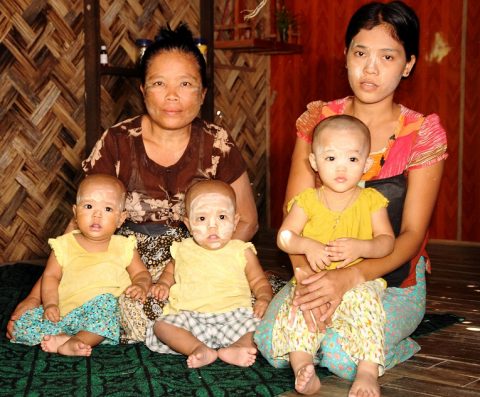
Nwe Kyi with one of her daughters and three granddaughters.
Her favorite LWF trainings include Disaster Management and Preparedness, Maternal and Child Health and, especially, the Anti-Human Trafficking training given by a police official sponsored by LWF.
“After Nargis I was always worried whenever I saw strangers in our village. We heard that human traffickers frequented villages to persuade young women to come with them, promising lucrative salaries. But after attending these trainings I now know how to protect my family, especially my daughters and three granddaughters”.
Text: Khin Moe Moe Aung
Photos: Myo Thame / c4dm ltd Myanmar
*Ko = Mr. (honorific)
**Daw = Ms. (honorific)
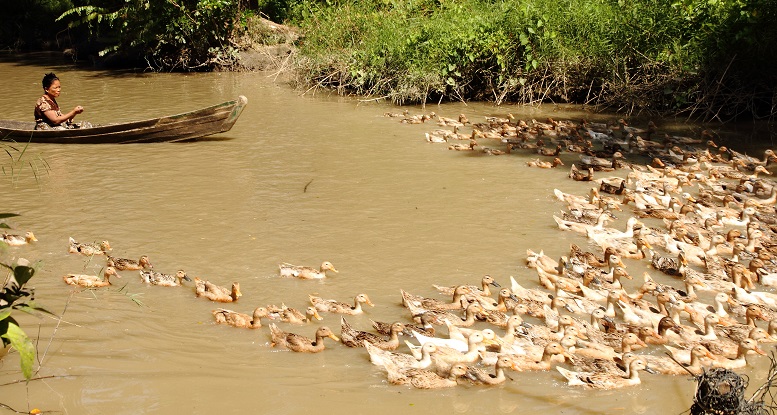
Daw Nwe Kyi and her ducks.













